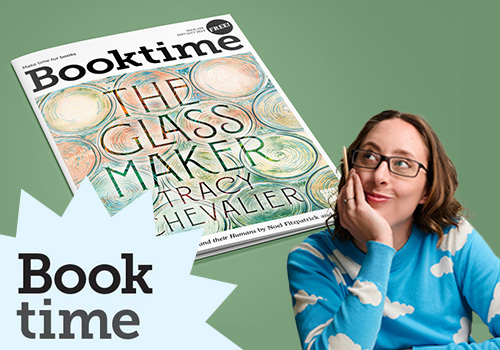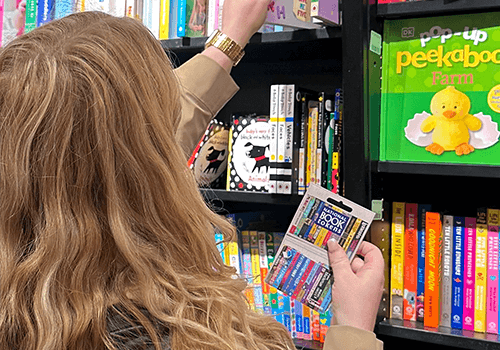Booktime: Interview with Jessie Burton, author of Hidden Treasure
From the bestselling author of The Miniaturist and The Restless Girls, Hidden Treasure is a beautiful children’s adventure of magic and mystery, set over a century ago, and with the River Thames at its heart. We interviewed the author Jessie Burton to find out more.
This exclusive feature is from the March-April 2025 issue of Booktime magazine, the essential guide to the most anticipated books of the season. Find a free copy of Booktime in your local independent bookshop.

"Children are sophisticated, and I always like to write up to them, not down."
Hidden Treasure is a children's adventure story. How different is it writing adult and children's fiction?
This one felt a bit different because, although I have written for children before, The Restless Girls and Medusa, those were based on fairytales and myths, so this is my first original story. You have to take into consideration the readers' age in terms of themes and vocabulary and pace. But whether you’re writing a children's or adults' book, in the first instance you're writing for yourself. You've got something inside you that you've got to write, and you don't have too many thoughts in your mind when you're writing it if it’s going to be for children or adults. It comes from the same well, the same place, and I don't find my approach to be different. As I worked through more drafts, I worked with my editor on the sophistication and complexity of the book, but children are sophisticated, and I always like to write up to them, not down.
Why did you set the story in 1918?
I've always been interested in what it was like for normal people and families during the First World War. So many young men didn’t come home. The country was rigidly class structured at that point. One in three officers, middle class men and boys, didn’t come back and one in eight working class soldiers. You can imagine the impact of that in towns and villages and streets in London. It’s always captured my imagination, the knock-on effect. I wanted to explore what that might have felt like, without it being the heavy focal point of the book. I wouldn’t describe it as a First World War novel, but I wanted to look at it obliquely.
There are lots of strong women in the story. Was this because the men were away at war?
Yes. It was this really strange time in women’s lives, when they were driving trucks, working in munitions factories and teaching in classrooms because the men weren’t there to do it. Across the classes, women had more freedom, which was then curtailed when the men came back. I thought that was an interesting fact to explore – what it would mean for someone like Miss Cressant to be able to flex her muscles a bit. The phenomenon of the 'maiden aunt' spread through the century because there were fewer men.
The River Thames is central to the book.
Did you research the mythology of the river?
Not really, I just responded to my own feelings about the river, and the universal ideas of rivers in general, as a sources of life, a passage between life and death, a source of renewal, and of extraction. All the things we unconsciously associate with rivers and water, I think I also was associating. I was thinking of the River Thames as this endless, ancient pathway through the city of London, it being a working river, but also something that gives life and takes it away.
Do you also see it as a river of time?
Yes, absolutely. It does seem timeless when your down there, on the river. If you go past an old 17th or 18th century church spire that will ring out on a Sunday morning, it's very bizarre, you fell like it’s centuries ago.
How did you go about writing the ballad that appears in the book?
I made it up! I knew the idea of ballads, their vernacular and storytelling, but it was my invention. I wrote that ballad so many times. The ballad had to reflect the plot, but the plot kept changing, so it was a nightmare!
Have you set it to music?
No! I have musical friends who I'd hope would set it to music, but for me it was more the metre which I had to get right. It’s more of a poem than a song.
Grief is a theme in the story – do you think that grief is a process of letting go?
Yes. I think that Bo is at the beginning of understanding what she’ll have to go through regarding her grief. But in the ballad you see the pain of a mother who has lost a son, the difficulty of letting go. There is also a comfort than can maybe come from understanding that the experiences we have of loss enable us to remember those that are gone. The people we love don’t leave us because they live in our memories, unconsciously they are with us. It's a very difficult process, grief, everyone deals with it differently.
There are couple of big twists towards the end of the book – were they planned from the beginning?
No, they crept up on me. When you're writing your unconscious reveals itself for you in draft after draft. You're taking a leap of faith and hoping that something good comes out of it. At the end of the first draft, the storyline involving Billy revealed itself to me. I had to take a choice and I then knew where I was going.
Which other authors inspire you in your work?
Hilary Mantel inspired me greatly, both in her books and in the way she conducted herself in the world. I was lucky to meet her at a historical fiction conference in Pasadena and she was generous, supportive, funny and witty. And her actual writing and her work ethic inspire me always. I love Kate Atkinson's work, I love the way she writes. I very much enjoy the writing of Elizabeth Strout and Ann Patchett, I think that they are unbelievable writers. Whenever they publish a book, I know I’m going to read it.
What do independent bookshops mean to you?
They mean a great deal. I'm lucky in that we have quite a few near where I live in south-east London. You know when you walk into one that these people actually really like books. They read books and they curate their collection, and they hand-sell. I've been published now for ten years and my first book The Miniaturist was hand-sold by independent booksellers and that was a huge part of its word-of-mouth success. They are havens and I’ve always had a great love for them.

About Hidden Treasure by Jessie Burton
Bo's dad died when she was very young and her brother Harry is off to war. But she loves to mudlark on the foreshore of the River Thames – indeed, the river often speaks to her. So, when, one August day, she finds a beautiful piece of jewellery with moon design, she feels her luck might be in. But on touching the moon, she’s soon struck by a vision which seems very real. What can it mean? That day she meets Billy, an orphan who also has an affinity with the river, and who works in the kitchen at Muncaster Hall, and the pair soon become friends.
When Bo is accosted by Dr Muncaster, who is after the moon, she realises that it may be worth much more than she thought. She soon discovers that the other half of the jewellery, a sun, is missing, and if they are put together they have magical qualities. With the help of Billy and her new teacher Miss Cressant, can she discover the other half, and an ancient ballad that connects them? And can she use the magic to restore what is most dear to her? With a pacy story full of secrets and strong and memorable characters, Hidden Treasure is perfect for fans of Katherine Rundell and Philip Pullman.
In this extract, Bo meets Billy on the foreshore of the River Thames:
Huge stacks of cloud crossed the sun, and the exposed riverbed stopped glistening. In the dull light, Bo saw someone else moving straight towards her, this time along her side of the river. She steeled herself, but as the figure came nearer, she realised he wasn’t even looking at her.He was a boy in a plain white shirt and dark navy trousers, worn and patched at the knees. Bo thought he was older than her – something about the way he held himself – but he was on the skinny side. Hatless, with dark hair sticking up wildly on his head, his boots looking like he slept in them. His gaze was on the water’s edge, reading the clay, and it looked like he could understand the language of the river.
Come on girl, she told herself. Have your wits about you.
The boy caught her watching, and he narrowed his eyes, almost as if she had interrupted him. Bo turned her own gaze to the water and slipped the moon into her pinafore pocket. The cloud passed over the sun and day turned bright again.
Now the boy moved with more intention.
'Nice day for it,' he called.
'For what?' said Bo.
The boy came a little closer, and stood with a hand on his hip, one boot perched on a small piece of old ship timber. He grinned, 'Ah, come on. You’re searching for treasure.'
He had a musical way of landing his syllables. Bo scowled. 'Never mind what I’m doin'. What are you doin'?’ She thought about her brother Harry, how later this afternoon he would be heading to the war. 'There’s a war on, you know,' she said. 'Ain't you old enough to be a soldier?'
The boy raised one dark eyebrow. 'I’m twelve,' he said.
Bo couldn’t hide her surprise. She felt the pain in her head receding, the tingling in her limbs fading away. His eyes were like dark green stones, containing flecks of gold lit by the sun reflecting off the water.
'She's not giving up much today,’ he said, as if trying to keep the peace.
'You mean me or the river?’
Bo replied.
The boy threw back his head and laughed an amazing laugh, like sunlight coming through mist. She couldn't help grinning.
'Let’s say the river,' the boy said. 'You just have to let it give you what it wants.'


